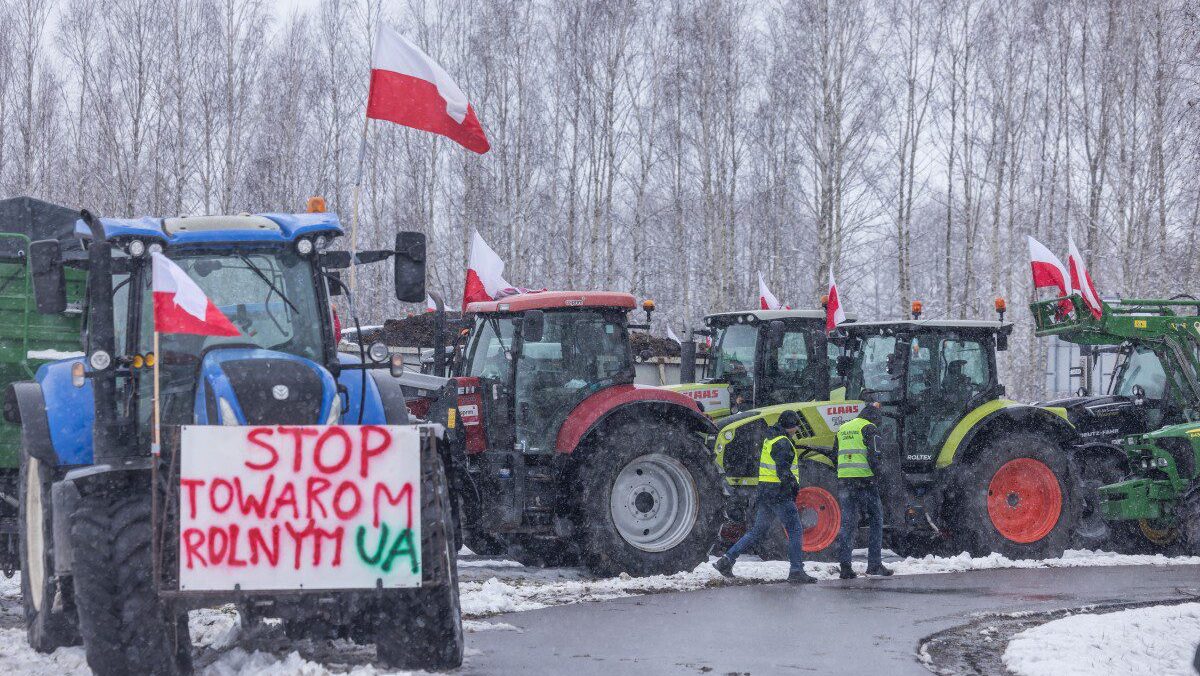
Polish farmers and truckers blockaded Ukrainian border crossing points earlier this year to protest cheap agricultural imports.
Photo: Wojtek Radwanski / AFP
The question of whether the EU can even afford all the new members currently lining up to join by the early 2030s will be probably the most debated part of the whole enlargement discussion in the next couple of years.
While enlargement used to be considered a merit-based process linked to legal reforms and economic compatibility, the Russian invasion of Ukraine fundamentally altered Brussels’ perceptions. The EU accession of Ukraine (and to some degree of Moldova, and even Georgia) has become a strategic question, with a security dimension that easily trumps every other concern that might arise.
That might change in the coming years as the bloc gets closer to actually integrating Ukraine and others into the EU and Europeans realize what the true cost of enlargement will be.
Some already do, judging by the persistent protests put up by farmers and truckers blocking Ukrainian border crossing points in Poland and elsewhere earlier this year and throughout 2023. Brussels’s deal with Kyiv that allows the uncontrolled flow of cheap and low-quality Ukrainian grain into the EU, undermining the local agri sector’s competitiveness, is but a small prelude to what is to come once the country has become a full member.
Combined, farmers throughout the EU till about 160 million hectares of arable land. Ukraine alone would add another 40 million hectares, profoundly changing the internal dynamics of the single market. The fear among farmer communities that the incoming flood of much cheaper agricultural products would make them go bankrupt after Ukraine becomes an EU member is already deeply rooted, and would only get stronger in the coming years.
Currently, eight candidate countries are waiting to join the EU, but their stories are not the same. Most in the Western Balkans have been waiting for a decade or two for their ticket to join the club (Serbia, Albania, North Macedonia, and Montenegro), while the Eastern European countries (Ukraine, Moldova, Georgia) are newcomers jumping the queue out of perceived geopolitical necessity.
According to the European Council’s own leaked calculations, the accession of all the candidate countries would cost the EU common budget at least an additional €256 billion over the first seven-year budgetary period. About €186 billion (or over 72%) would be spent on Ukraine only. And that’s on top of the €500 billion the West needs to spend on the country’s reconstruction once the war’s over, as well as the €155 billion the EU already committed in the form of financial and military aid.
After the accession, the Ukrainian agricultural sector alone would be entitled to over €96 billion out of the Common Agricultural Policy’s funds, which is estimated to result in a cut in agricultural subsidies going to today’s member states by about 20%. Ukraine would also receive another €61 billion in so-called ‘cohesion funds’—money meant to help poorer member states develop their infrastructure and economy until they reach the EU average. With all eight candidate countries admitted, the Council estimated that the Czech Republic, Estonia, Lithuania, Slovenia, Cyprus, and Malta would no longer be eligible for cohesion funds.
Yet, for the time being, Brussels sticks to the narrative that Ukraine’s membership is vital to the long-term security of Europe while branding anyone who might raise a question as a Russian proxy. But after the June EU elections, with the national conservative bloc increasing significantly, the enlargement debate, like many others, can be expected to become somewhat more balanced.
Polls indicate, for instance, that the right-wing populist Identity and Democracy (ID) group could add more seats than any other group in the Parliament. ID is home to parties such as the German AfD and the French Rassemblement National, both of which advocate for fundamentally changing what they call the EU’s ‘failed’ Ukraine strategy that turned the country into a bottomless money sink without apparent results.
The need to review the implications of Ukraine’s EU accession over the next five years does not mean that other candidates’ accession processes should be paused either. Economically;, Europe would barely notice the accession of the Western Balkan countries, while integrating the region into the bloc would serve very important strategic goals, primarily in combating illegal migration.
That is also why Hungary has repeatedly stated that moving forward with the Western Balkans’ membership case was one of the main priorities of its upcoming EU Council presidency, starting in July. Integrating the Balkans is the only way to effectively eliminate the primary land-based migratory route to Europe, after all, while also significantly shortening the EU’s external borders that need to be defended.
